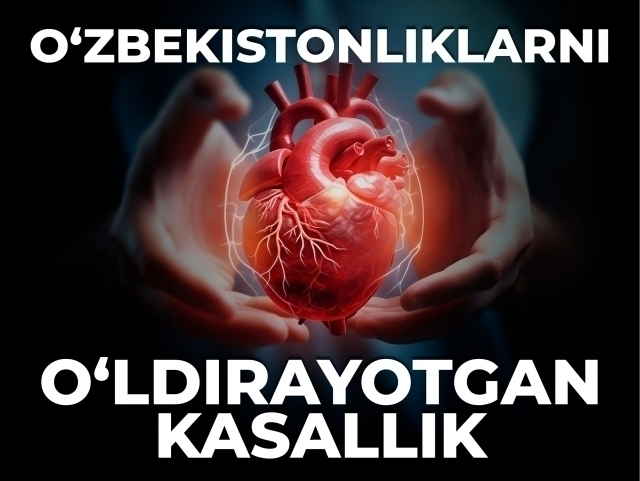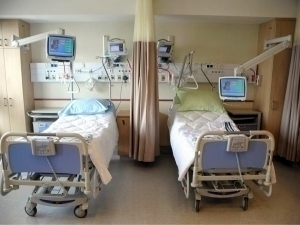How to fight cardiovascular diseases?
Wellness
−
31 January 2025 23911 6 minutes
According to statistics, cardiovascular diseases are the leading cause of death among Uzbeks. In particular, more than half (57.2%) of the 131,000 people who died between January and September 2024 succumbed to cardiovascular diseases. WHO reports indicate that approximately 18 million people die from these diseases annually, with Central Asia being one of the most affected regions. To raise awareness and provide valuable information, QALAMPIR.UZ interviewed cardiologist and candidate of medical sciences Hamidulla Toshpulatov.
Iqbol Ergashova, Correspondent: — Could you provide information about cardiovascular diseases and their most common types?
Hamidulla Toshpulatov, Cardiologist: — Cardiovascular diseases are the leading cause of death worldwide. According to WHO, circulatory system diseases account for 30% of global deaths each year—42% of which are due to ischemic heart disease and 38% to stroke. Additionally, one in three adults over the age of 18 has high blood pressure.
The most common type of cardiovascular disease is hypertension (arterial hypertension), where blood pressure exceeds normal levels. The standard blood pressure for a healthy individual is 120/80 mmHg, though it can fluctuate between 100/70 and 140/90 throughout the day. If blood pressure consistently exceeds 140/90 mmHg, hypertension is diagnosed. Symptoms of hypertension include headaches, dizziness, blurred vision, sleep disturbances, and irritability. As a chronic condition, it can damage vital organs such as the heart, kidneys, brain, and eyes. The most severe complication is stroke, which occurs when a blood clot forms in the brain, often resulting in disability or even death.
Another common type of cardiovascular disease is ischemic heart disease, which occurs when the narrowing of the coronary arteries disrupts the heart muscle’s blood supply. The resulting lack of oxygen causes severe chest pain, often triggered by physical or emotional stress when blood pressure rises. This pain typically originates in the chest and may radiate to the shoulder blade and left arm. Without proper treatment or emergency medical care during severe episodes, complications such as myocardial infarction (heart attack) and sudden death can occur.
Iqbol Ergashova, Correspondent: — What are the main causes of these diseases, and who is more prone to them?
Hamidulla Toshpulatov, Cardiologist: — Cardiovascular diseases often develop in people who lead sedentary lifestyles, consume excessive fatty foods, smoke, drink alcohol, or experience chronic stress. Additionally, these diseases can be hereditary. Individuals with close relatives who have had high blood pressure, myocardial infarction, or ischemic heart disease are at higher risk. Such individuals should be particularly mindful of their health and take preventive measures."*
I.E.: — What are the symptoms of cardiovascular disease, and when should one consult a doctor?
H.T.: — Cardiovascular disease often begins with frequent headaches, irritability, insomnia, and chest pain. Stabbing pains may occur during physical or emotional stress but tend to subside with rest. As these symptoms become more frequent, along with recurring spikes in blood pressure, it is essential to consult a cardiologist. Patients should undergo an electrocardiogram and blood tests, and if a predisposition to the disease is detected, take timely measures to slow its progression.
I.E.: — How should patients with cardiovascular diseases adjust their lifestyle?
H.T.: — Patients should adopt a healthy lifestyle by engaging in regular physical activity, quitting smoking, getting enough sleep, spending time outdoors, and reducing fatty foods in their diet. They should consume easily digestible, vitamin-rich foods and strictly follow their doctor’s recommendations.
I.E.: — How does modern medicine treat cardiovascular diseases? How have new methods and technologies improved diagnosis and treatment?
H.T.: — Today, modern medical technology plays a crucial role in the diagnosis and treatment of cardiovascular diseases. Highly effective medications and advanced treatment methods are widely used. These include echocardiography, which evaluates heart function and the condition of heart muscles and valves, and Holter monitoring, which tracks heart activity over 24 hours. Other key diagnostic tools include treadmill testing, MRI, MSCT, automated biochemical analysis, and endovascular coronary angiography.*
For treatment, procedures such as stenting, electrophysiological (EFI) diagnostics, and radiofrequency ablation are used to address complex cardiac arrhythmias. Additionally, cardiac surgery and coronary artery bypass grafting help restore blood flow to the heart. These modern diagnostic and treatment methods enable early disease detection, improve patient outcomes, prevent serious complications, and significantly reduce disability and mortality rates.
I.E.: — What advice would you give to people on preventing cardiovascular diseases?
H.T.: — To prevent cardiovascular diseases, individuals should prioritize their health by staying physically active, following a balanced diet, and avoiding harmful habits such as smoking and excessive alcohol consumption. It is also essential to treat viral and infectious diseases promptly, maintain a healthy balance between exercise and rest, and undergo regular medical check-ups. If any signs of cardiovascular disease appear, consulting a doctor without delay is crucial.
I.E.: — How does modern medicine treat cardiovascular diseases? How much do new methods and equipment facilitate treatment and diagnosis?
H.T.: — Today, modern medical equipment is used in the treatment and diagnosis of cardiovascular diseases, and treatment measures are carried out using highly effective drugs and modern technological treatment methods. These include echocardiography, which studies the function of the heart and the condition of the heart muscles and valves, Holter monitoring, which monitors the heartbeat throughout the day, treadmill testing, MRI and MSCT, automatic biochemical analysis, endovascular coronary angiography and stenting, EFI diagnostics and radiofrequency ablation methods aimed at surgical treatment of complex cardiac arrhythmias, cardiac surgery, and coronary artery bypass grafting. The use of such modern treatment and diagnostic methods allows for early detection and effective treatment of the disease. This, in turn, leads to alleviation of the condition of patients, prevention of serious complications, and reduction of disability and mortality rates caused by the disease.
I.E.: — What advice do you give people to avoid cardiovascular diseases?
H.T.: — In order to avoid cardiovascular diseases, a person should pay attention to his health, regularly engage in sports, timely treat viral and infectious diseases, follow a diet, exercise and rest in moderation, give up harmful habits, regularly undergo preventive medical examinations and consult a doctor if signs of the disease appear.
Iqbol Ergashova
Live
All


